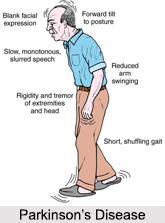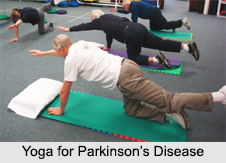 Parkinson`s disease is a serious chronic disease of the nervous system. It is characterised by stiffness of muscles and a continuous tremor or shake. It is a disease of the extra-pyramidal system. This disease is also known as `Paralysis Agitans` or `Shaking Palsy`. Patients with mild form of Parkinson`s disease continue this way for many years before any serious symptoms develop. In severe and advanced cases, however, the patient is not able to move, and presents a distressing spectacle, for his mind may be uninjured but still he cannot speak or write.
Parkinson`s disease is a serious chronic disease of the nervous system. It is characterised by stiffness of muscles and a continuous tremor or shake. It is a disease of the extra-pyramidal system. This disease is also known as `Paralysis Agitans` or `Shaking Palsy`. Patients with mild form of Parkinson`s disease continue this way for many years before any serious symptoms develop. In severe and advanced cases, however, the patient is not able to move, and presents a distressing spectacle, for his mind may be uninjured but still he cannot speak or write.
Symptoms of Parkinson`s Disease
The patient shows a combination of tremor of the limbs and muscular stiffness. These tremors are more noticeable when the patient is at rest, and tend to disappear when he attempts to move or when he is asleep. The tremors are more pronounced, when he is excited or fatigued.
Older patients occasionally exhibit involuntary rapid jerking movements of their arms and legs. In a less extreme form the condition presents as purposeless mastication and lip smacking movements. Later, there may be impairment of speech and the patient may complain of cramping pains in the back because of muscle spasm.
Causes of Parkinson`s Disease
The brain changes that lead to Parkinson`s disease are not fully understood. It, however, appears that they involve the nerve cells containing melanin, the pigment that gives skin its colour. These cells called `Substantia Nigra` are concentrated in the part of the brain called the `Basal Ganglia`. As the cells deteriorate, production of dopamine a chemical that carries messages within the brain falls and the result is the characteristic symptoms. Parkinson"s disease may follow severe attacks of encephalitis or some type of poisoning, such as carbon monoxide. 
In older patients, this type of palsy may be due to hardening of the arteries in certain vessels leading to the brain. In most cases, however, the disease begins to show itself in later middle age, and is considered to be a consequence of `degeneration`, particularly in the Basal Ganglia. Parkinson`s disease may also result from deficiency of antioxidant Vitamin E earlier in life. Less intake of Vitamin E foods earlier in life may somehow leave the brain vulnerable to the onset of Parkinson`s years later.
Treatment of Parkinson`s Disease
Treatment of Parkinson`s Disease by nature cure is recommended to be the best one. Diet plays an important role in the treatment of Parkinson`s disease. The patient should always follow certain rules regarding eating. These include taking of water or other liquids half an hour before and one hour after a meal and not with meals, eating very slowly and chewing the food as thoroughly as possible and never eat to full stomach. Even the use of vitamin E in high doses is considered beneficial in the treatment of Parkinson`s disease.
Exercises also cure Parkinson`s disease. Combining meditation with yoga may also improve muscle tone and control. The patient should remain as active as possible and lead a quiet life. Fresh air and light exercise, especially walking, are essential for the treatment of Parkinson`s disease. Treatment of Parkinson`s disease by Magnetic Therapy and Water Therapy is also effectual. Parkinson`s disease is a painful and traumatic one that needs immediate diagnosis and treatment before reaching the fatal stage.




